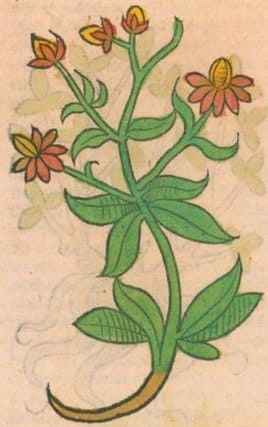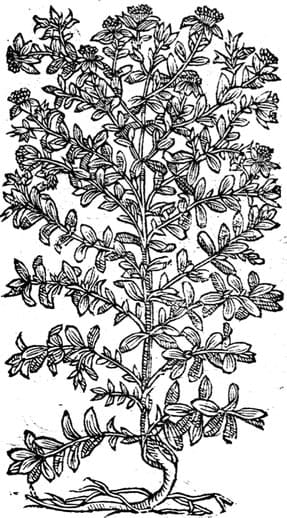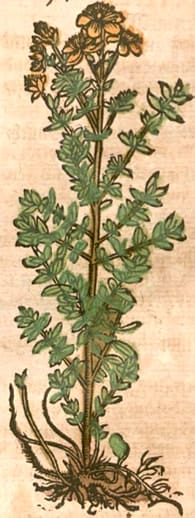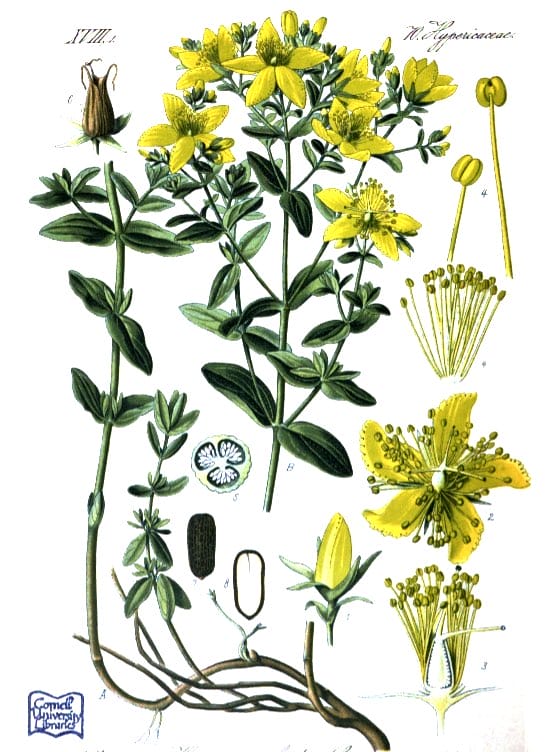Hypericum, St. John’s WortHiofariqun (Unani)Guan Ye Lian Qiao 贯叶连翘 (TCM) |

|
 Ortus Sanitatis, Meydenbach, 1491
Ortus Sanitatis, Meydenbach, 1491

|

|
|
Dioscorides Materia Medica, Mathias, 1563 |
Krauterbuch, Lonitzer, 1578 |
 Flora von Deutschland (21), Kohler, 1885
Flora von Deutschland (21), Kohler, 1885Botanical name:
Hypericum perforatum (syn. H. officinalis)
A number of local species have been used including H. humifusum
Parts used:
Herb
Temperature & Taste:
Cool (traditionally classed as Warm), dry. Pungent, Bitter
“hot in the second degree and dry in the last phase of the second degree” (Avicenna).
Classifications:
2A APERIENT MEDICINES. 2B ATTENUATERS. 2D ATTENUATERS OF CONGEALED BLOOD. 2P. HEMOSTATIC.
2T. GLUTINATE 2W. SARCOTIC
3C. ALEXIPHARMIC. 3E. DIURETIC. 3G. EMMENAGOGUE. 3M. ARTHRITICS
4f. SPLENETIC. 4k. ARTHRITIC
Uses:
1. Clears Heat, Settles Wind, Calms the Mind:
-nervous conditions, Insomnia, Trembling, Melancholy, Depression, Anxiety, Fear
–Traditionally for Stupidity, Fear and Paranoia, Foolishness, Troubles of the mind, Enchantments, Foolish Imaginations
-Epilepsy, Apoplexy, Paralysis, distilled water (2–3 oz.) (Pemell, 1652)
-Russian peasants use a Tincture for Dizziness
–Hyperactive and Aggressive children
-‘its fruit purges out Black Bile’. (Avicenna)
-long used to clear Evil Spirits and abate Witchcraft
2. Moves the Blood, Clears Stasis, Promotes Healing, Eases Pain:
-Trauma; Bruising, Fractures, Burns, Wounds including puncture Wounds; ‘No better Wound herb’ (Pemell, 1652)
-mainly to cleanse and heal Wounds, injuries affecting the Nerves etc. (int. and ext.)
-“dissolves Congealed Blood” (Salmon)
-Headaches, Migraine, Spinal Pain, Fibrositis
-Lower Back Pain, Hip Pain, Sciatica.
-‘Regular oral intake of its decoction with wine for forty days cures Sciatica’. (Avicenna)
-Powder taken with wine for Gout (Arthritis). (Pemell, 1652)
-“its chief property is to promote the discharge of menses” (Avicenna)
-chronic Uterine diseases, postpartum pain, irregular Menstruation and PMS
-Internal Ulcers
-Tumors; adjunct for Cancer
-“useful for treating large, cold and hard swellings” (Avicenna)
3. Clears Heat, Stops Bleeding: (West, TCM)
-Hematuria, Vomiting Blood, Profuse Uterine Bleeding
-Bleeding from Trauma
–‘all manner of spitting and vomiting of Blood, be it by any Vein broken inwardly, by Bruises, Falls, or howsoever’. (Culpeper)
-traditional midwives prescribed it for bleeding during and after childbirth
4. Opens Obstructions, Promotes Urine, Breaks Stones:
–suppressed, scanty, difficult or painful urination
-Urinary Tract Infection (West, TCM)
-Gravel and Stones (Bock)
-Salt of the herb cures Stones (Pemell, 1652)
-Jaundice, 2 handfuls boiled in 1½ pints water or wine, strain, add sugar (Pemell, 1652)
5. Clears Heat, Resists Poison: (Herb, Seed)
-Fevers; Tertian and Quartan Fevers; decoction of the seed cures Tertian and Quartan Fever (Pemell, 1652)
-Bacterial and Viral infection including Herpes and Hepatitis
-promotes expression of Rashes in children
-venomous Bites: Rabid Digs
-internal suppuration (Hippocrates)
6. Clears Heat, Stops Cough and Wheezing:
-coughing, wheezing, shortness of Breath with thin white phlegm as seen in chronic Bronchitis, chronic Catarrh
-pulmonary Consumption
-Salt of the herb for Pleurisy (Pemell, 1652)
–Hippocrates used it for Lung diseases
7. Benefits the Kidneys, Clears Deficient Heat:
–Menopausal symptoms, especially with Hot Flushes, Anxiety, Palpitations, Depression, Incontinence or Neurosis
–Incontinence and Bed-wetting in Children
-Sciatica, chronic Back Pain, Arthritis
8. Kills Worms: (Seed, herb)
-Thread-worm, especially in Children
9. Externally:
-Oil or Ointment is applied to swellings and to help close the lips of Wounds, and may be used internally and externally for Ulcers including those of the leg.
-‘Sprinkling over putrefactive and soft Ulcers as a dusting powder proves very useful’. (Avicenna)
-powder sprinkled or distilled water applied on Wounds, Sores, and rotten Ulcer cures them (Pemell, 1652)
-applied to Bruises, Contusions and Ecchymosis.
-oil or ointment is applied to Burns, hot swellings, inflammations, Dermatitis, Herpes, Shingles, Sores, Tumors (including those of the Breast)
-“A plaster of its leaves is useful for healing burns, large wounds and malignant ulcers” (Avicenna)
-Venetians used it topically to stimulate hair growth, believing it renewed the roots of even the baldest of heads.
-special for Burns (Leclerc)
-as a fumigation to promote Delivery
Dose:
1. Seed and Herb can be used in similar Doses:
2. Taken with Wine to move the Blood
Powder: 2–4 grams (traditionally 1–2 drams)
Decoction: 3–9 grams
Tincture (1:5) 1–4 mls.
Substitutes:
“Equal quantities of Schoenanth and the roots of Caper are substitutes for hypericon” (Avicenna)
Main Combinations:
Balm & St. Johns wort
Mind, Nerves:
1. Mental Illness, Madness, Melancholy, St. John’s wort with Scarlet Pimpernel, Bugloss, Rosemary, Rose, Cassia Wood, Saffron (as in Tincture of Hypericum)
2. Nervous Exhaustion, Anxiety, St. John’s wort with Balm, Hawthorn, Peppermint, Valerian, Hops and Lavender
3. As a Nervine, and for Insomnia:
i. St. John’s wort with Camomile, Hawthorn, Rose
ii. St. John’s wort with Valerian, Hops, Betony, Lavender, Avens, Primula (Rose)
iii. St. John’s wort with Valerian, Hops, Balm, Lavender as a wine
4. Restless or aggressive children:
i. St. John’s wort, Passion flower, Valerian (See research here)
ii. St. John’s wort with Balm, Camomile, Rosehip
5. Depression:
i. St. John’s wort with Balm
ii. St. John’s wort with Saffron
iii. St. John’s wort with Scarlet Pimpernel
iv. associated with Menstruation, St. John’s wort with Yarrow
v. St. John’s wort with Balm, Scullcap, Orange peel
vi. St. John’s wort with Balm, Borage, Rose
vii. St. John’s wort with Peony, Elecampane, Licorice
viii. St. John’s wort with Rose, Sandalwood, Licorice
ix. St. John’s wort with Dodder, Polypody, Agaric
6. Headaches, Migraine, St. John’s wort with Betony, Feverfew, Vervain, Balm
Gynecology:
7. Promote and Regulate Menstruation:
i. St. John’s wort with Mistletoe (Kißner)
ii. St. John’s wort with Mugwort, Pennyroyal, Balm, Oregano, Rue, Centaury, Fennel root, Asparagus root, Elecampane (as in Syrup of Mugwort)
8. Menopause:
i. St. John’s wort with Balm and Sage
ii. St. John’s wort, Black Cohosh
iii. St. John’s wort, Dang Gui, Peony root, Sage
Urinary:
9. Enuresis:
i. St. John’s wort with Horsetail
ii. St. John’s wort with Oak bark, Camomile, Uva Ursi, Agrimony, Tormentil, Catechu (Peyer)
10. Urinary Tract Infection, St. John’s wort can be used as a stand-alone herb (TCM)
11. Bed-wetting:
i. St. John’s wort with Agrimony, Shepherd’s Purse
ii. St. John’s wort with Balm and Orange flower
Bruising, Trauma, Bleeding:
11. Bruising, Trauma:
i. St. John’s wort with Calendula (or Safflower)
ii. St. John’s wort with Madder, Rhubarb, Costus, Nutmeg, Cumin (as in Powder Against Bruising)
iii. St. John’s wort with Agrimony, Angelica, Betony, Bugle, Comfrey, Plantain, Tormentil, Wormwood (as in Decoction for Wounds)
iv. St. Johns wort with Comfrey, Tormentil, Vervain, Ladies Mantle, Centaury (as in Universal Vulnerary Decoction)
12. Bruising, Aches, Pains, Sprains, St. John’s wort with Wormwood, Gentian, Blessed Thistle, Tormentil and Earthworms prepared as an oil (as in Compound Oil of Hypericum)
13. To heal Wounds in 24 hours, flowers of St. John’s wort and Rosemary (1 handful each), put into a glass and cover with Oil, seal it, and place in the sun for 3 days. Strain, add Ginger (1 dram), Saffron dissolved in wine (a little), and sit in the sun for 18 more days. Annoint the Wounds with the warm oil twice daily. (The Secrets of Alexis, 1615)
14. Spitting or Vomiting Blood, St Johns wort seed powder (½ dram), Knotgrass, Plantain, in Syrup of Quince (Pemell, 1652)
15. Vomiting Blood, St. John’s wort with Agrimony (Xian He Cao) (TCM)
Other:
15. Spleen diseases, St. John’s wort with Vervain, Rue, Sage, Plantain (Pharmacopoeia Wirtembergica, 1798)
16. Stomach neurosis and bloody diarrhea, St. John’s wort with Yarrow (Fischer)
17. Arthritis:
i. St. John’s wort with Sarsaparilla, Guaiacum, Mistletoe, Germander, Ground Ivy, Sage, Rosemary (as in Wine for Arthritis)
ii. St. John’s wort with Centaury Ground Pine, Agaric, Germander, Gentian (as in Antidote of Seven Things of Paulus Aegineta)
18. Sciatica: “Regular oral intake of its decoction with wine for forty days cures sciatica” (Avicenna)
18. Hives, St. John’s wort with Rosehip, Nettle, Calendula
19. Hard Tumors of the Breast, St. John’s wort with Bittersweet, Elder bark and Datura as an ointment for topical use.
20 Diabetic Ulcers, St. John’s wort, Neem oil topically. (Research has found this effective)
21. Acute Sore Throat, use the decoction as a gargle (TCM)
Major Formulas
Antidote of Seven Things (Paulus Aegineta)
Decoction for Wounds
Decoction for Jaundice
Syrup of Mugwort (Augustana)
Tincture Against Schirrus of the Spleen
Powder Against Bruising
Powder Against Rabies
Electuary for Arthritis
1. Compound Vinious Tincture of St. Johns wort:
i. Benzoin (3 oz.), Storax (2 oz.), Balsam of Peru (1 oz.), Aloe, Myrrh, Olibanum, Angelica root (½ oz. each), Dried St. Johns wort flowers (4 handfuls), Red Wine (4 pounds). digest the flowers and roots in the wine for 3 days in a warm place; then when cold, express, digest the other substances in the tincture for 15 days, frequently shaking, and strain. (Pharmacopoeia Sardoa, 1773)
Cautions:
1. Generally Safe and well-tolerated.
2. Photo-sensitising effect.
3. May negate the effect of oral contraceptives.
4. It has been stated to be safe for use when Breastfeeding and has no commonly recognised contraindications for use during pregnancy. However, research has found pre-treatment with Hypericum reduced pregnancy rates in rats, increased gestation but with lower fetal development (as determined by weight). It also showed Liver and Kidney damage. It must be noted that these effects were in rats, which doesn’t necessarily relate to human pregnancy. In addition, anecdotal reports suggest concomitant administration of Hypericum with oral contraceptives may negate the effects of the contraceptives which would tend to contradict the above research. (I personally know of a case of advanced endometriosis who was on oral contraceptives and who conceived while taking Hypericum, despite the fact that her gynecologist said it would be near impossible to conceive–Adam). A case of pregnancy occurring while simultaneously taking Hypericum and the oral contraceptive pills was reported here. However, other research has shown no interaction between low-dose oral contraception and Hypericum.
To confuse the issue, further research has shown negative effects on Ovarian function.
With all this in mind, perhaps it would be wise to reduce or eliminate Hypericum in those wishing to become pregnant, especially if they have a history of difficulty conceiving. Large doses or long-term administration during pregnancy and breastfeeding is best avoided.
It would likewise be wise to tell women taking oral contraceptives that Hypericum may negate the effects.
Drug Interactions
1. Anti-convulants
2. Cyclosporin or Anti-HIV drugs
3. Digoxin
4. SSRI’s
5. Warfarin
6. Oral Contraceptives. (Reports it may negate the effect)
7. NSAID (appears to enhance aggravation of gastrointestinal mucosa associated with NSAID’s).
–Herb–Drug Interactions with St John’s Wort (Hypericum perforatum): an Update on Clinical Observations
–Clinical relevance of St. John’s wort drug interactions revisited
–St John’s wort (Hypericum perforatum): drug interactions and clinical outcomes
–Pharmacokinetic Interactions between Drugs and Botanical Dietary Supplements
–Influence of different Hypericum perforatum L. preparations on pharmacokinetic and pharmacodynamic properties of pentobarbital, diazepam and paracetamol
–Pharmacovigilance: Effects of herbal components on human drugs interactions involving Cytochrome P450
Main Preparations used:
Distilled Water, Simple and Compound Oil (much used), Salt from the Ashes, Tincture of St. John’s wort
1. Extract of St. Johns wort flower:
i. St. Johns wort flower (1 pound), Alcohol (5 lbs.). Extract, press, strain; then boil the residue in water (3 lbs.), and clarify the decoction with egg white. Mix the liquors together, distill off the alcohol, and evaporate to an extract. (Pharmacopoeia Wirtembergica, 1798)
2. Syrup of St. Johns wort:
i. Fresh flowers of St. Johns wort (1 ½ pounds), Boiling Water (1 pound). Macerate 24 hours, then express, and to every 9 ounces of liquor add White Sugar (16 oz.) (Pharmacopoeia Wirtembergica, 1798)
3. Tincture of St. Johns wort:
i. St. Johns wort flowers (4 oz.), Alcohol (1 ½ lbs.). Digest for 3 days, press strongly, filter. (Pharmacopoeia Wirtembergica, 1798)
4. Compound Tincture of St. Johns wort:
i. Dried St. Johns wort flowers, Calamus root (½ oz. each), Alcohol (3 lbs.); digest in a moderate heat in a covered vessel for several days, shaking from time to time, then add Benzoin (3 oz.), Storax, Balsam of Tolu (of each 2 oz.), Myrrh (½ oz.). Digest and strain
A stimulant, used internally and externally. Dose: 6 drops–½ scruple. (Pharmacopoeia Hispana, 1798)
5. Oil of St. Johns wort flowers:
Vulnerary, Anodyne and Pectoral, and good for skin diseases.
i. Fresh St. Johns wort flowers (3 parts), Olive oil (4 parts). Digest for 8 days in a warm place.
ii. Some used 1:2, others 1:8.
iii. Fresh St. Johns wort flowers (1 part), Olive oil (4 parts). Expose to the rays of the sun in a sealed vessel for 1 week, then boil slightly, and strain. Repeat this operation twice more, the last time using dried flowers and leaving to infuse for a month.
iv. St. Johns wort flowers, Olive oil, White Wine (of each 3 pounds), boil to the consumption of the humidity and add: Venice Turpentine (1 pound), Saffron (2 drams). Strain after 24 hours. (Pharmacopoeia Generalis, 1783)
6. Compound Oil of St. Johns wort flowers:
i. Olive oil (6 pounds), Rosemary, St. John’s wort, Rue (1 ½ lbs. each). Digest for 3 days in a warm place then add: Earthworms (½ pound); boil to the consumption of the humidity and dissolve in the strained oil powders of: Sandarac, Myrrh, Olibanum, Mastic (2 oz. each). Strain and keep.
|
For Incubus or Succubus (Spirits attacking in our sleep. These were called ‘Mare‘ in old English and is the origin of the word nightmare) ‘I have read, as many more hath done, that can tell if I do write true or false, there is an herb named fuga |
Demonum, or as the Grecians do name it Ipericon. In English it is named Saint Johns wort, the which herb is of that vertue that it doth repel such maliciousness or spirit’. (Boordes Book of Knowledge, 1542) |
